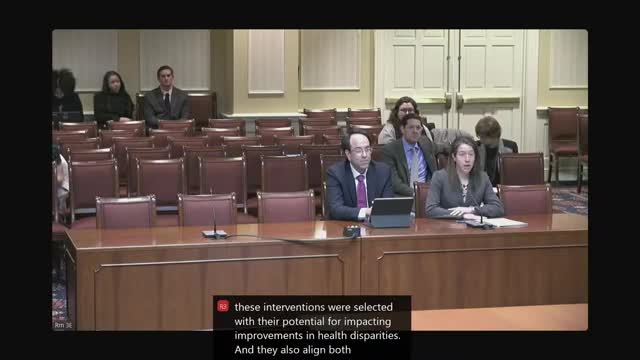Officials urge extension of maternal and child health fund to 2027 to sustain Medicaid programs (Senate Bill 213)
Get AI-powered insights, summaries, and transcripts
Subscribe
Summary
John Kromm (HSCRC) and Laura Goodman (MDH) asked the Finance Committee to extend the maternal and child health improvement fund’s sunset to Dec. 31, 2027, to sustain Medicaid and public-health programs shown to improve maternal and infant outcomes.
John Kromm, executive director of the Health Services Cost Review Commission, and Laura Goodman, deputy director of the Medicaid Office of Innovation, Research and Development at the Maryland Department of Health, testified Jan. 15 in strong support of Senate Bill 213. The bill would change the maternal and child health improvement fund’s sunset date from Dec. 31, 2025, to Dec. 31, 2027, allowing the department to continue and scale programs that align with Maryland’s total cost of care and AHEAD models.
Why it matters: The fund, established in 2021 through budget reconciliation and financing legislation, has supported Medicaid-led interventions and public-health programs intended to reduce severe maternal morbidity, childhood asthma and related disparities. Kromm said HSCRC has allocated $40,000,000 to maternal and child health interventions to date and projects a remaining fund balance of about $24,100,000 at the end of fiscal 2025. Extending the sunset would allow MDH to use the balance through 2027 and leverage federal Medicaid matching to effectively increase resources available for the programs.
Program details and evidence: Goodman and other presenters described five Medicaid programs supported by the fund:
- Home visiting services: evidence-based models Nurse-Family Partnership and Healthy Families America were expanded statewide; Medicaid supports 16 programs across 14 Maryland jurisdictions. Goodman told the committee these programs are being implemented in tandem with public-health grant-funded efforts to broaden reach.
- Medicaid-reimbursed doula services: Medicaid reimbursement for doulas went live in February 2022. MDH has simplified administrative requirements, increased the number of credentialing organizations from nine to about 30, permitted single contracts with managed care organizations during early implementation, and increased labor-and-delivery rates to improve provider participation.
- Centering Pregnancy: a group prenatal-care model with an added Medicaid billable code; MDH has supported up to eight Centering Pregnancy sites and said early evaluation shows encouraging outcomes.
- HealthySteps: pediatric screening and specialist supports for ages 0–3, with enhanced reimbursement for implementing practices.
- MOM program: enhanced case management for pregnant and postpartum Medicaid enrollees with opioid use disorder; MDH reported approximately 115 participants to date and said the program has helped reduce neonatal intensive care unit stays and support broader life-stability outcomes.
Evaluation and committee questions: Goodman said preliminary evaluations from about 18 months of implementation show improvements in compliance with later-term postpartum visits and reductions in severe maternal morbidity indicators, low birth weight, NICU admissions and birth complications among program participants. Chair Bridal and other senators pressed MDH for details on outreach and asked for a list of jurisdictions participating in home visiting; Goodman agreed to provide those materials. Committee members also asked whether the fund will be replenished; witnesses said the HSCRC-funded maternal and child health account will not automatically replenish and that, without the extension, continuation would require identifying state general funds or other sources.
Closing: Witnesses told the committee they intend to spend the remaining balance by the end of 2027 if the bill passes and urged a favorable report. No formal vote was recorded in the transcript during the hearing on SB 213.
